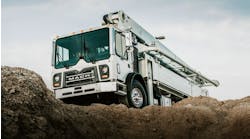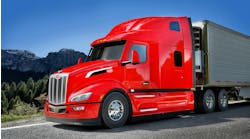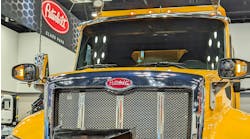DALLAS. Daimler Trucks North America (DTNA) will make its long-anticipated move to supply a broad range of integrated powertrain components next year, according to president & CEO Martin Daum. With its Detroit Diesel proprietary engines now installed in roughly three-quarters of its Freightliner and Western Star trucks, the company will add its own axles to the product mix under the new Detroit brand name, he said at a press conference.
Daum and Andreas Renschler, head to DTNA’s parent Daimler Truck Group, also broadly hinted that Detroit would soon follow with heavy and medium-duty transmissions as the company moves to fill out integrated powertain offerings in the North American market. The Detroit brand will be officially launched next March during the Mid-America Trucking Show.
Adding “optimized powertrain components” under the new Detroit brand name is “the next step in completing the portfolio” begun when the company introduced it’s current Detroit Diesel engines in 2007, Renschler said at a press conference. The move is part of a Daimler global strategy that recognizes “trucks are different around the world, with different usages and regulations, but they can share components,” he said. “There is, for example, 70 to 80% commonality in engines among our brands worldwide.”
That global strategy is the only way to bring the economies of scale needed to continue developing new technologies required to improve fuel economy and lower the total cost of ownership for Daimler Truck customers, according to Renschler.
While proprietary or integrated powertrains are common in most other truck markets, North America has traditionally relied on third-party suppliers for major truck components such as engines, transmissions and axles. With that model now under pressure with truck OEMs indicating that they will expand proprietary offerings, the traditional component suppliers are looking to their specialized expertise and support networks to remain competitive.
Dana Holding Corp., a major producer of commercial vehicle axles and other drivetrain components “is expert in the products we build,” said Santiago Salzar, global marketing manager for Dana’s commercial vehicle products group. “The OEMs excel at system integration, but not necessarily at individual component technologies,” he told Fleet Owner.
Technology and product support with organizations like Dana and Eaton’s Roadranger organization “will keep us in the game,” Salazar said. “The OEMs have a lot on their plates, but we are focused on the things that are core to our business.”



